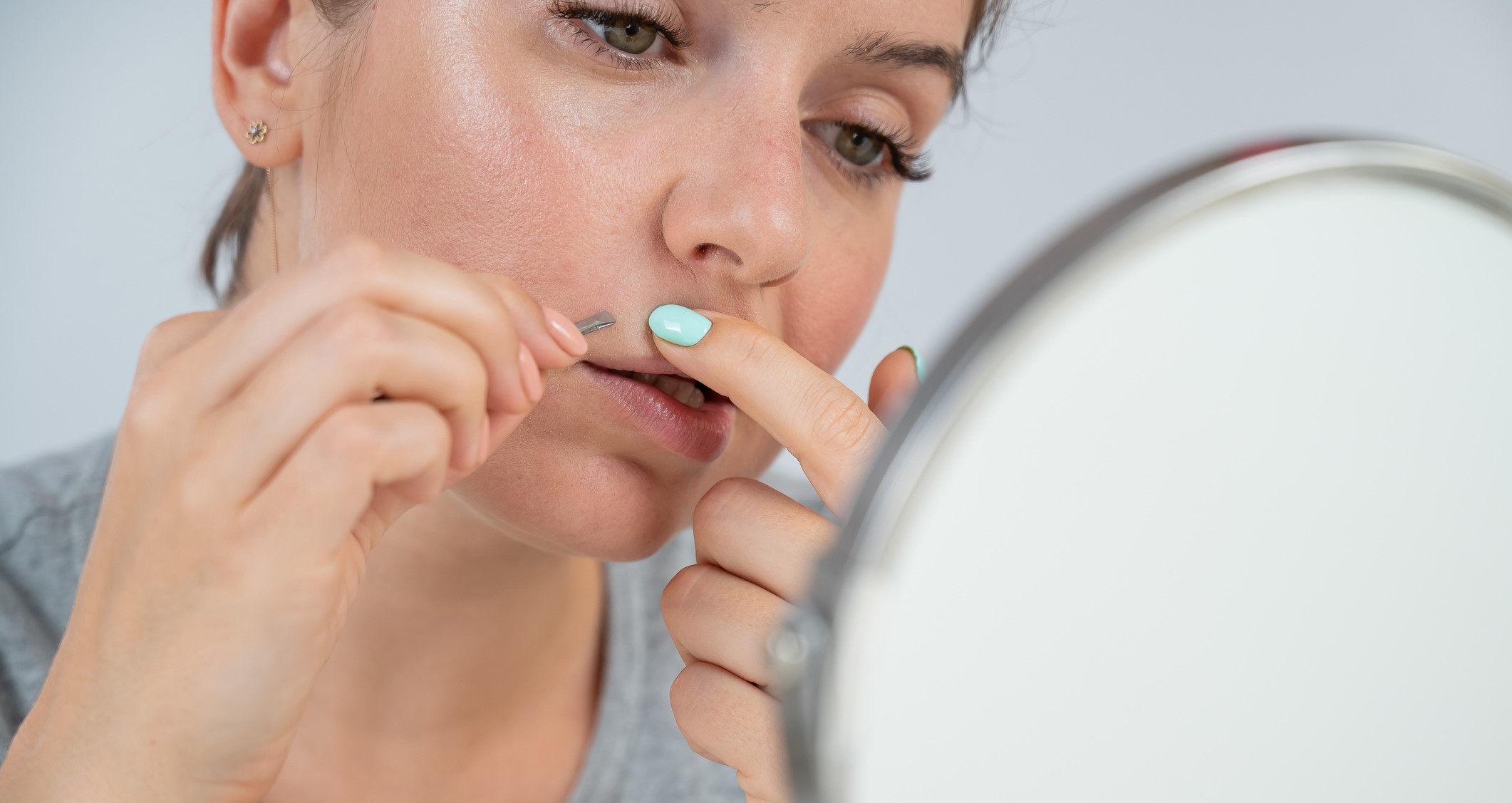
Medically Reviewed by Dr. Lee Hwee Chyen
MBBS MRCP (UK) FAMS (Dermatology)

Unwanted hair growth is a common problem affecting both men and women and can manifest as dark, coarse hair on the face, chest, or back. It can cause self-consciousness and may be a sign of certain health conditions, leading many people to seek treatment for its removal. This comprehensive guide will be covering the causes, symptoms, diagnosis, and treatment options for unwanted hair growth.
Androgens, the hormones largely responsible for male traits and reproductive activity, are present in both men and women. An excess of these hormones or an increased sensitivity to them can lead to unwanted hair growth, especially in women as androgens stimulate hair growth and cause hair to become thicker and darker.
This change in hair growth patterns can be due to conditions such as Polycystic Ovary Syndrome (PCOS). PCOS is characterised by an increased production of androgens by the ovaries, which can cause hair growth on the face, chest, back, and other parts of the body where men typically have hair. This is often associated with other symptoms, such as menstrual irregularities and acne, further indicating hormonal disturbances.
Certain medications can lead to unwanted hair growth as a side effect.
Steroid medicines, especially anabolic steroids, can cause hair growth due to their androgen-mimicking properties. Other medications, such as cyclosporine, a drug used to suppress the immune system, and phenytoin, a drug used for seizure disorders, can also cause excessive hair growth.
Various health conditions can cause excessive hair growth due to their impact on the body’s hormone balance.
Cushing’s syndrome, for example, is a condition that occurs when the body is exposed to high levels of the hormone cortisol for a prolonged period. This can lead to a host of symptoms, including weight gain, acne, and, notably, unwanted hair growth.
Similarly, disorders of the adrenal glands, which are small hormone-producing glands located on top of each kidney, can cause an overproduction of androgens leading to unwanted hair growth.
Certain types of tumours, particularly those affecting the ovaries or adrenal glands, can also cause excessive hair production due to the hormones these tumours produce.
Unwanted hair growth is primarily characterised by the appearance of thick, coarse, dark hair in areas where men typically have hair but women do not. These areas commonly include the face (especially the upper lip and chin), chest, back, and abdomen.
Other parts of the body, such as the arms and legs, may also be affected. This hair growth differs from the finer, lighter hair that many women have on the upper lip, chin, breasts, or abdomen.
The severity of this condition can vary from a few stray hairs in one or more of these areas to a more male pattern of body hair.
Depending on the underlying cause, individuals with unwanted hair growth may experience additional symptoms that signify hormonal imbalance. These can include:
In some cases, these symptoms can occur with other signs of virilisation (development of male physical characteristics), such as an enlarged clitoris and changes in body shape (increased waist-to-hip ratio).
If unwanted hair growth presents with these more pronounced signs of virilisation, it may be indicative of a more serious underlying medical condition.
Your dermatologist will usually conduct a detailed interview to gather information about your health background. This might involve questions about past illnesses, particularly those related to hormonal disturbances such as thyroid disease or polycystic ovary syndrome.
Information about menstrual regularity is also significant, as irregular periods could indicate a hormonal imbalance contributing to abnormal hair growth. Your dermatologist may ask about medication use, especially drugs known to stimulate hair growth. Family history may also be considered, as some conditions have genetic links.
The dermatologist may order a series of blood tests to confirm a suspected hormonal imbalance. These tests can measure the levels of various hormones in the body, including androgens (like testosterone) and hormones that regulate them (like luteinising hormone or follicle-stimulating hormone).
High levels of androgens or an abnormal ratio of regulating hormones can point towards specific causes of unwanted hair growth. Other tests may be recommended based on the patient’s medical history or symptoms.
If PCOS is suspected, sometimes an ultrasound scan of the pelvis may be arranged.
These include shaving, waxing, or plucking, all of which remove hair at the surface of the skin or slightly below it. These methods can be effective in managing the appearance of unwanted hair, but they are temporary solutions and need to be repeated regularly. While generally safe, these methods can sometimes cause skin irritation or ingrown hairs.
Medical treatments aim to slow hair growth or address the underlying causes of unwanted hair growth. Prescription creams like eflornithine can slow the growth of facial hair, but they do not eliminate existing hair and may take several weeks to show results.
Oral medications such as anti-androgens can also be effective. These drugs work by blocking the effects of androgens or by reducing their production. They can help to slow hair growth and reduce the appearance of new hair, but often take several months to produce visible results and can have side effects.
In some cases, birth control pills or other forms of hormonal therapy may be recommended to regulate hormonal imbalances that contribute to unwanted hair growth.

Several procedures are available for a more permanent solution to unwanted hair growth. Laser hair removal uses concentrated light to damage hair follicles, which reduces hair growth. The procedure may require multiple treatments and can cause temporary skin irritation, but it is a more long-term solution compared to at-home methods.
Remember that while these treatments can manage unwanted hair growth, they may not be suitable for everyone. The choice of treatment depends on various factors, including the underlying cause, the hair growth’s severity, the patient’s age and health condition, and personal preference.
Discuss these factors and each treatment option’s potential benefits and risks with your dermatologist.
Dealing with unwanted hair growth often requires a two-pronged approach: managing existing hair and preventing or slowing further growth. For immediate results, regular shaving, waxing, or using depilatory creams can help manage the aesthetic impact of unwanted hair growth. These are simple methods that can be incorporated into one’s daily or weekly personal care routine. As mentioned earlier, these methods offer only temporary relief, and the hair will regrow.

While you cannot prevent unwanted hair growth caused by genetic factors or certain health conditions, adopting a healthy lifestyle can help manage some contributing factors. Regular exercise and a balanced diet can help maintain a healthy weight.
Reducing stress can also have a positive impact on hormonal balance.
Be mindful of any sudden increases in hair growth, especially if it’s accompanied by other symptoms such as menstrual irregularities, acne, or weight gain. Regular self-examinations and awareness of one’s body can lead to early detection of any potential issues, thereby allowing for early intervention.
If unwanted hair growth is sudden, causes distress, or is accompanied by other concerning symptoms, see a dermatologist promptly. It could be a sign of an underlying medical condition that needs to be addressed. Early diagnosis can open up a wider range of treatment options and improve outcomes.
Understanding the causes, symptoms, and available treatments for unwanted hair growth can go a long way in managing this condition. Anyone struggling with unwanted hair growth should remember that help is available. Our MOH-accredited dermatologist can provide effective treatment plans to address this condition.
Feel free to drop by our our clinic and meet our specialist
101 Irrawaddy Road #16-09
Royal Square at Novena, Singapore 329565
 +65 8701 7662 (WhatsApp Enquiries Only)
+65 8701 7662 (WhatsApp Enquiries Only)
Mon - Fri (09:00am - 05:30pm)
Sat (09:00am - 1:00pm)
Sun & Public Holidays (Closed)